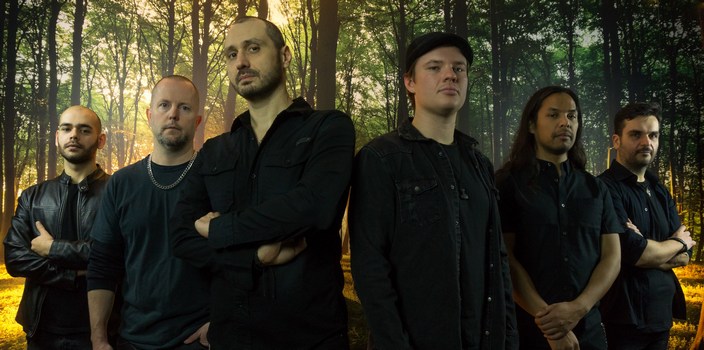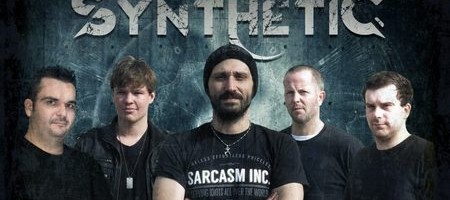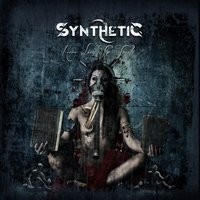Synthetic – Time Carries On
Thursday, 22nd October 2020
Last we caught up with modern melodic death metal act Synthetic was 2016 after they released their debut, Here Lies the Truth. Since then, the band has signed with a label (Rock of Angels Records) and recently put forth their sophomore effort, Clepsydra: Time Against Infinity. So it seemed the time was ripe to chat with vocalist Sterge Bititsios and guitarist Simon Charkas. An indepth discussion, in which we talk about plenty of Clepsydra-related material, what the band has been up to in the last few years, working with Ettore Rigotti of Disarmonia Mundi, and much more.
Dead Rhetoric: What have you guys been up to for the last four years between albums?
Sterge Bititsios: The first few years after we released Here Lies the Truth, we focused on building the band. Initially, it was just Simon [Charkas] and myself. It started as a studio project, so when the album was released we decided to form a proper live band. So we spent some times finding the right people and building the band – learning how to play the album and trying to get as tight as we could. Basically preparing ourselves for gigs. That was the idea. Eventually we got to the point where we were ready to play and we had been given the opportunity to play locally to start. Then we managed to get down to London and play a few times too.
The next challenge was trying to get better with our live shows. One challenge is that Simon is not always with us, so we have to play live without him sometimes. It’s been tough, but we found ways around it. Obviously, it’s not the same – it’s always good to have my childhood friend with me on stage adding guitar magic. But the focus was on making the band work and getting to know each other well. We have tried to cultivate a family atmosphere, if you like. We have placed a lot of important on how we interact with each other, as well as how we interact with other people outside of the band. We have had a very clear vision of where we wanted to go. Our jobs, Simon and myself, were also to instill that vision to the new members of the band. To give them a reason to believe. I kept telling the guys, “We are going to get signed, let’s keep working.” And it happened! It’s great.
Once we got the act together and the live performances were good enough, we started writing the new album. We spent a good amount of time putting things together.
Dead Rhetoric: Given the time you spent to build things up for the band, did the impact the way you wrote songs for Clepsydra?
Simon Charkas: Things are different now, since it was just the two of us writing Here Lies the Truth. Now we have a great second guitar player with Faried [Verheul], and he has many great ideas. We have a keyboard player who we can use outside just having a secondary influence on the music – the keyboards have large impact on the sound now. More than Here Lies the Truth. Our bass player doesn’t just want to follow the riffs, and we love this. To make them all work, we needed more time. But the result pays off.
Bititsios: It was a challenge to organize all of these people, who are coming in with different ideas and influences but I think that’s where innovation happens. When you bring different minds together with different backgrounds and influences. I think we have come to a point where we shouldn’t be feeling shy about using the word innovation. I’m not saying we are reinventing the wheel or making something completely new. But there is something about what we are doing that is a little bit innovative. It’s not your everyday stuff. I think that comes from the fact that there are so many different brains involved now, and we have our own thoughts about what our music should sound like. As Simon was saying, our keyboard player is a multi-instrumentalist, so he is also a great bass and guitar player as well. He can write riffs if he wants to. There’s a lot of ideas coming from new directions.
Dead Rhetoric: You were talking about innovation – do you feel there was any extra emphasis on things with a number of the tracks going above 7-minutes? To get them to take advantage of that longer time frame?
Bititsios: I smile because this is my constant argument with the band [laughter]. I don’t want our songs to be over 4 minutes [laughs]! It’s not commercially viable, what do you not get [laughs]? I have to say, the guys are great musicians, and brainy people as well. So I tend to think more about the commercial side of things – what will sell and what won’t sell well. Is a 7-minute song going to sell, I don’t know? But the guys come up with stuff that changes my mind! Like, “Oh yea, that I can do!” So the length wasn’t intentional, right Simon?
Charkas: Not at all. The title track is a good example. It started with a verse and some chord progressions, then Hallam [Smith] came in with his great keyboards and a big melody and all of a sudden we had a big 7 minute song! It wasn’t intentional for sure.
Dead Rhetoric: With the commercially viable side, how important is a good hook that needs to sit inside Synthetic’s music?
Bititsios: 100%. Let’s be honest. If we want to break through and do something good with this band, we have to think commercially. We have to. I don’t care if we are called sell outs or whatever, I don’t care about that. We aren’t going to do pop music or R&B, I can tell you that. We will always be a metal band, but you can be commercially viable even with metal. We all know that. I think it’s very important, especially these days where there are so many bands and so much stuff coming out. The competition is crazy! How do you stand out from the crowd? You have to have those hooks. For me, the hooks come with melody – that’s the hook for me personally. Simon might think differently…
Charkas: No I agree – melody is the most important thing. Actually, people singing our songs.
Bititsios: The choruses – this is something that Simon and I have been working on religiously since the first album. Sometimes there’s more success than others, but it’s a process and we are learning. But we have been very particular about the big choruses. We knew from the beginning – it’s exactly what Soilwork has been doing. That’s what I love about Soilwork. That’s what works well in my head, and I want us to do that as well. To have those big melodic choruses in your head that you can easily sing along to. Obviously the riffs are another one – Simon is a very riff driven guitarist and I love riffs as well. That’s also important.
Dead Rhetoric: Well it’s good that between the two of you both aspects are covered – one looks out for one thing and one looks out for another.
Bititsios: We know each other well, we have known each other forever, but we also know each other musically very well. The great thing about Simon is that although he’s a great guitar player, he’s not egotistical. When he writes, he has a vision for the vocals as well so he’s going to leave plenty of room for the vocals. He’s not your typical guitar player who just wants to put his own solos and riffs all over. That’s smart – we were talking about commercial viability and that’s how you need to think if you want to be successful, in my head.
Dead Rhetoric: I must say, it’s refreshing to hear someone talk about metal and discuss being commercially viable. There are so many bands that are either afraid to say it, or they are afraid to try for it. They are concerned about that backlash of “I can’t listen to this because they are too poppy or something like that.” There’s a place for metal to be commercially viable without compromising the music.
Bititsios: That’s nice to hear, that’s encouraging. I think you’re right. There’s a few bands that do that. Again, Soilwork these days. I’m never going to stop talking about Soilwork [laughs]. I don’t think they have the following they deserve, but for me, the way they approach their songwriting, sound, and style completely agrees with what I have in my vision for the band. I think Simon is on the same page as well. I’m not saying that we are trying to copy those guys, but on the contrary, we want our own spin on things. It’s the philosophy. It’s not the songs or notes or riffs, it’s the philosophy we are trying to shoot for. It works for us. If people like it, great – if they don’t we will just call it a day and go home and play [laughs].
Dead Rhetoric: In finding your own pathway, how do you feel Synthetic stands out from other acts?
Charkas: I think it’s mostly our vision for each song. Like Sterge said, I don’t always think about the guitar, I think for the song itself. Each one of us in the band tries to bring the best things for the song. I think that’s one of the best things about us. The melodies are very important, but many bands have great melodies. So working for the song is the biggest thing for us. I write this stuff for someone to sing – even the solos you can sing. They are easy to remember. It’s not always 100 notes per second. We could do it if we wanted to, but it doesn’t work for me as a listener.
Bititsios: It’s a lot like design. Professionally, I come from a design background. I have spent a lot of time reading and thinking about design. A good designer is one who designs for people, and not for themselves. That was a problem in the past, as they designed for themselves and not the people actually buying it. That’s our approach to songwriting as well. We give the song the opportunity to grab people’s attention instead of giving each of us the opportunity to individually shine within the song.
Charkas: On top of that, I would add that we think as listeners – we are the first listeners. We want to like this stuff. I think of myself, or Sterge, as a listener and what we would like to hear. If more people like it, it would make us happy.
Bititsios: It has to satisfy us as creators and listeners to start with. If we manage to write the stuff that we want to hear, but no other band uses, that’s what success looks like for us. I have a gap in my metal music listening experience. If no one else fills that gap for me, Synthetic is going to fill that gap for us.
Dead Rhetoric: How important has Ettore [Rigotti]’s mix been for your two releases?
Bititsios: I can’t say enough about him.
Charkas: We are so happy to have his involvement. He is so important to us. It’s not just the mixing, he helps us to be better musicians and craft a better result. He’s like a producer, but he’s not the type to just say, “Go change the chorus.” Although he did that once for this album. But the way he does it is that he suggests things to make it a better song.
Bititsios: It was “Slipwalk” for this album. He had the brains and clarity to recognize that this would be ‘the one.’ A few months later, that was the song picked by the label to be the first single. Ettore already knew. He told us that it would probably be our number one song. He told me that I had all of these amazing choruses on the other songs, but not this one. This is probably going to be your best song, so you may want to rethink the melody. This was after the recordings were done, but I decided I’d give it a go. I spent a few days rerecording and coming up with ideas – just playing tennis with Ettore and asking his thoughts. He’d say that he still wasn’t feeling it, and that I could do better. I would sing something better, but the performance wasn’t there. He’d come back and say, “What is wrong with you? You are out of tune? Do it again!” This summarizes how viable his input is, and how big of a heart he has. I don’t know if he has this patience with every other band he works with, but with us, he has been a brother, a friend, and so patient.
With the first album, he took us by the hand and taught us how to record like a professional band. we didn’t have the experience, but he spent the time and held our hands. He showed me how to effectively how to record vocals, and showed Simon how to record his guitars and edit them. Honestly, I could spend another hour talking about him.
Charkas: We worked on Here Lies the Truth for like 9 months. He had never spent that much time with a band.
Bititsios: On Here Lies the Truth he was with us from the beginning. For Clepsydra, we recorded everything and he was given the files. He didn’t have to hold our hands this time because we knew how to do things this time based on his guidance on the previous album. But he has been extremely patient with us again since this album was a real pain in the ass to mix. There’s so much going on in there. The variation among the songs is quite large, so how do you find a sound that fits all? He’s done a fantastic job.
Dead Rhetoric: You just put the video out for “Slipwalk.” Is there anything you can say about this track?
Bititsios: I was laying on the sofa before bed listening to Nightrage. I went to lie down, and that melody came into my head, and I kind of liked it. So I ran to the other room to play it on guitar and I came up with a chuggy riff behind it. I said to Simon that I had this riff and asked what we could do with it. Then Simon created this beauty out of the melody.
Charkas: So Sterge came with the main melody and then I added all of the background. At first, it was a straight-forward and heavy power song with melodeath vocals. Then Hallam came in and laid down these amazing keyboards at the beginning of the song. Then Faried came in and put in the ambient, clear guitars. It became huge.
Bititsios: The guys were so critical when Simon presented the idea. They said it sounded a lot like Iron Maiden [laughter]. I said that was a good thing! But they didn’t like that dual, harmonized guitars and they felt uncomfortable with it. But then it changed when everyone added their parts, and it sounded nothing like Maiden. Even our drummer, who isn’t a typical drummer because he comes from a different background even though he loves metal. He’s more of a proggy/jazz drummer.
Charkas: He does some amazing drums in the interlude, in the middle of the song. There’s so much going on there. The chorus has the melody and the catchy riffs, but there’s more.
Bititsios: The lyrics are mostly centered around the views of technology. How we abuse social media and how we dependent we are on it and the internet. How vain we can be with selfies and crap like that. When I say ‘dark clouds have sent you to sleep,’ it’s not talking about clouds in the sky but the cloud. You get hypnotized by all these things and stop thinking/being critical. But every can interpret the song their own way too. In the video, we had a lot of trouble finding someone to help us during the COVID situation. We ended up making it ourselves.
Charkas: When we did the video, we were in six different locations. My supervisor at work had the idea of being in there individually, with the white background. Sterge was the director of the video. It seems to be growing pretty fast for our standards at least.
Dead Rhetoric: You have a label behind you now and a new album, what goals do you have for Synthetic moving forward?
Bititsios: The plan was to go on a proper tour for the first time and tour around England as well as Greece, where Simon and I come from, because there’s people who want to see us. We want to go to Germany, Sweden, and all of those other metal countries in Europe. Obviously the big dream is to play in the US but that’s not going to happen anytime soon for a band of our size. It will remain a dream for the next few years [laughs]. But that was the plan and vision. Then COVID happened, and now we have to rethink our plans.
We are trying to come to terms with the new reality. Maybe it’s a good time to start building our digital footprint, because it’s not very good. I think this album is our gateway and what will help us get a more prominent presence on the digital platforms, like streaming services and social media. We need to utilize this time to build up the band digitally. The label is helping out with a lot of that right now. If we ever get out of this pandemic situation, then we want to get out and play and promote our music. To become better players on stage and make a better show. To meet new people and make new fans. Right now we have a lot of friends, and we’d like to make some fans at some point. That’s the plan. To keep growing and making new music. Simon and I have already started talking about the third album, and that’s important. We have to have a new album in less than two years.
Dead Rhetoric: You mentioned Soilwork and Nightrage already. What do you enjoy about melodic death metal?
Charkas: It’s an eccentric mix of different stuff. At first it was really strange in combining these melodies and leads with growls and screams but now it seems like a natural thing for me to do. It’s so powerful. That’s what I like most about it.
Bititsios: For me, there was a time where metal started dying in me to be honest. Around 1999 or so, I was so disappointed with all the bands I used to love. I was tired of what Maiden was doing, Metallica was off my radar by then, the same for Megadeth. Pantera didn’t exist anymore and that was a problem. The bands I loved as a teenager were just fading out and I was losing hope and faith in it. Then nu metal came in and bands like Slipknot and Disturbed came in and it was fine for a little while but it wasn’t my kind of thing. Then one day I discovered Soilwork’s Natural Born Chaos. I decided to give it a shot, and it reignited my passion for metal. I found my place again in metal.
So I discovered Soilwork, then I got into In Flames. Where were these bands all this time? That’s my relationship with melodic death metal and what it means to me. It’s a genre that is now becoming bigger and bigger. You have bands from Finland that are cool, and their melodic death metal sounds different from bands like In Flames and Soilwork. There’s more variety now. At the Gates have a completely different style from Insomnium, but they are both amazing. So because it reignited my passion for metal, it has a special place in my heart.
Dead Rhetoric: So there’s no space for touring now. Do you have any digital plans in the future?
Bititsios: There are three videos that are coming out for Clepsydra. But now that we have spent a lot of time making videos, we thought we should use the time to make more videos for the album. If we can manage to make a video for each song, then why not? This is one of the things we have in our mind. The other one is that we have been very shy and hiding for a long time. We need to get out there and show our faces – talk about what has inspired us and share the history behind the songwriting. The funny anecdotal stuff that no one knows about, so using our YouTube a bit more. To get closer to fans and friends.



























